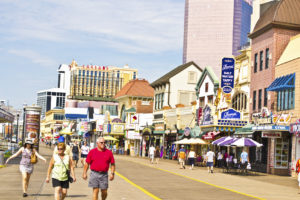Nicknamed the Garden State, New Jersey is the fourth smallest of the 50 U.S. States. It is also the 11th most populous state.
New Jersey’s most famous city, Atlantic City, is best known for its famous boardwalk. This four-mile-long promenade was constructed in 1870 and to this day remains the place where the majority of the city’s attractions are found. Among its most popular tourist spots is Steel Pier, a carnival-style amusement park that has rides for all ages, including a massive observation wheel with climate-controlled gondolas that gives riders amazing views over the city and the ocean year-round.
There are two climatic zones in the state. The south central and northeast parts of the state have a humid subtropical climate, while the northwest has a humid continental climate (microthermal), with much cooler temperatures due to higher elevation. The state receives between 2,400 and 2,800 hours of sunshine annually.
Business Climate
New Jersey’s economy is multifaceted, but is centered on the pharmaceutical industry, biotechnology, information technology, the financial industry, chemical development, telecommunications, food processing, electric equipment, printing, publishing and tourism. The state’s agricultural outputs are nursery stock, horses, vegetables, fruits and nuts, seafood and dairy products.
New Jersey ranks second among states in blueberry production, third in cranberries and spinach and fourth in bell peppers, peaches and head lettuce. The state harvests the fourth largest number of acres of asparagus.
Shipping is a key industry in New Jersey due to the state’s strategic geographic location. The port of New York and New Jersey is the busiest port on the east coast. The Port Newark-Elizabeth Marine Terminal was the world’s first container port and today is one of the world’s largest.
Franklin Furnace is a famous mineral mining location for zinc, iron and manganese. Another natural resource that is vital to the economy of New Jersey is forestry. Forests cover 45% or approximately 2.1 million acres of New Jersey’s land area.
Tax Climate
The top individual income tax rate is 10.75% and the top corporate income tax rate is 10.5%. New Jersey has seven tax brackets that determine state income tax rates.
Apportionment: New Jersey uses a single sales factor formula for the apportionment of corporate income taxes.
Receipts from services and intangibles are sourced to New Jersey using the market-based sourcing method for taxable years ending on or after July 31, 2019. They are sourced based on where the intangibles are used.
Sales Tax Structure
The state sales tax rate is 6.625%, which ranks 8th in the nation. The state sales tax is applicable to all retail sales unless specifically exempted by law. These exemptions include most food items for at home preparation, medications, most clothing, footwear and disposable paper products for use in the home.
New Jersey has enacted economic nexus legislation. Effective June 1, 2018, retailers in the previous or current calendar year that have sales delivered into the state in excess of $100,000 or who have made 200 transactions into the state must collect sales and use tax.
A marketplace facilitator is required to collect and remit sales tax on sales made through any physical or electronic marketplace owned, operated, or controlled by a marketplace facilitator, even if the marketplace seller is registered with New Jersey for the collection and remittance of sales tax. However, a marketplace facilitator and marketplace seller may enter into an agreement with each other regarding the collection and remittance of sales tax.
New Jersey is moderate in its approach to the taxation of technology products for sales tax purposes. Generally, digital products that are transferred electronically are subject to sales and use tax. Prewritten computer software that is electronically downloaded is taxable. However, if it is sold to a trade or business, it is not taxable. Custom computer software that is electronically downloaded is exempt from taxation. Lastly, SaaS is not considered a transfer of tangible personal property and is not an enumerated taxable service. How products are produced, sold and delivered is critical to determining their tax status.
Many states have annual sales tax holidays, during which certain items the state wants to promote the purchase of (like school supplies, emergency preparedness supplies, or energy efficient appliances) can be purchased sales tax free. However, New Jersey does not currently have any scheduled sales tax holidays.
Random Facts
- Approving the Constitution on December 18, 1787, New Jersey became the third state to join the union, following Delaware and Pennsylvania.
- Cape May is the oldest seashore resort city in the United States and was declared a national Historic Landmark City in 1976.
- Thomas Edison’s laboratory was located in Menlo Park, New Jersey where he invented the light bulb, the phonograph and the motion picture projector.
- The George Washington Bridge is a double decker suspension bridge spanning the Hudson River between the Washington Heights neighborhood of Manhattan in New York City, and the borough of Fort Lee in New Jersey. In 2018, the Bridge carried over 100 million vehicles, making it the busiest motor vehicle bridge in the world.
- The state boasts an impressive musical legacy- Bruce Springsteen, Jon Bon Jovi and Frank Sinatra all hail from New Jersey.
- The state has a spoon museum featuring over 5,400 spoons from every state and almost every country.
Our team at Miles Consulting Group is available to discuss the specifics of your state tax situation, whether in New Jersey or other states, we can help you navigate the complex tax structures arising from your multistate operations. Call us to help you achieve the best tax efficiencies.




















